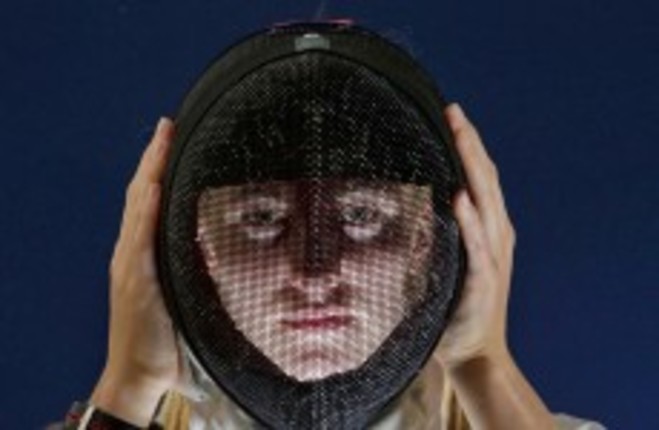ASK NATALYA COYLE about the personal sacrifices, the early training sessions on wet winter mornings, the feeling that she’s living her life out of a travel bag in hotel rooms, and each answer invariably begins with the same response. A shrug of the shoulders and five words that make it all worthwhile.
“I’m going to the Olympics.”
Coyle is no ordinary 21-year-old. While her Trinity College classmates stressed over the results of their first-year BESS exams, the Tara native was waiting for a different type of call.
On 16 June, two agonising weeks later than expected, it finally came. She became the first Irish athlete to qualify in modern pentathlon — a multi-discipline event which combines fencing, swimming, riding, running and shooting — and the country’s first representative since Moscow 1980.
The news was the culmination of a journey which started back in 2009. Coyle was competing nationally and internationally in tetrathlon, a variation of pentathlon for younger athletes without fencing, when her friend and training partner Eanna Bailey put an épée in her hand. As someone who is by her own definition “incredibly competitive”, she didn’t take much convincing.
Her step up coincided with the arrival of high performance director Lindsey Weedon who has transformed the country’s approach and attitude to the sport, Coyle explains.
“At the start, you’d think ‘Ok we’ll fence here’ and then someone else would say ‘But aren’t you supposed to do swimming there?’ And there’d be a meltdown.
It wasn’t even chaos, we weren’t really doing any training. Well, we were training but we weren’t training to get to the Olympics. Lindsey came along and she put a structure down, she put a plan in place. That was a big shock to the system on our part.
A former pentathlete herself, Weedon was able to plot a path forward. Earlier this year, she convinced Polish fencing coach Marek Makay to come on board while sports psychologist Kate Kirby is also a regular presence now.
“I used to think it wasn’t important,” Coyle says of her sessions with Kirby, “and I probably pushed it away a good bit but it’s essential. It’s like a sixth sport at this stage.
“It’s like a job — you don’t want to get up and do a different thing every time, you want to do the same thing each time so it comes naturally.”
But the most trying mental challenge must be living the dual life of a 21-year-old college student and an Olympian. While her friends and classmates are hanging out and socialising, Coyle is either dashing to a training session or catching up on some hard-earned sleep.
“A couple of people when they first meet me say ‘Oh, I haven’t seen you out.’ Well, there’s a reason for that. I sleep at night.
Everyone always asks if it’s difficult because you’ve to sacrifice so much but it’s not really. I’m going to the Olympics. Is there anything else? What else would I be doing?
The feeling of constantly being on the move from country to country, tournament to tournament, is the one thing that does get to her slightly. “I must be the world’s best packer,” she jokes but as she runs through a sample itinerary which takes in America, Rio, Paris, Budapest, Moscow and Rostov, it’s impossible not to feel exhausted just listening.
Olympic qualification began last August in London where Coyle finished 20th in a World Cup Final and didn’t finish until another World Cup Final in China last month. It has been a long year, particularly in the bleak winter months, but she has made some good friends along the way.
“Pentathlon is different to other sports. Sprinters probably don’t associate with each other; we live with other from February to October. Some of my best friends compete with me. I live abroad, I live with them pretty much.”
That bond was most evident when Coyle failed to qualify for the World Championship finals. The first person to console her was Great Britain’s world champion and top Olympic hope Mhairi Spence: “She was the first person to pick me up off the ground and tell me I can do this.”
Spence’s gesture is an example of the way in which Coyle has always tried to live her own life, both on the road and at home.
I think an athlete has to have two separate lives. You don’t want to be this hyper-competitive freak the whole time, and then you don’t want to be this mellow, chilled out person either. You need to get the job done.[Sports psychologist] Liam Moggan said to me the first time I met him that there’s no point in ever winning medals if there’s nobody to bring them home to. That’s the attitude, that’s what I live by. What’s the point in winning gold and everyone thinking you’re horrible?
Winning gold is still some distance away though, and as Coyle talks excitedly about London, it becomes clear that this summer is only the first phase of her masterplan.
“It’s about soaking it up and getting the most experience. Of course I’m going to perform to the best I can possibly do but I’m 21, there’s probably only going to be two or three people younger than me at the start line.
“In Rio I’ll still be young — 24, nearly 25 — so that’s when I’ll look to do my best performance.”

